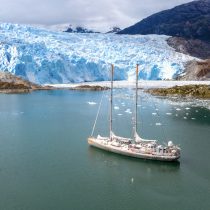
After three months sailing along the coasts of Chile from south to north, the laboratory ship Tara said goodbye to the national territory to continue its journey through the Caribbean and Atlantic seas. The expedition continues along the edge of the Pacific and Atlantic, and thus understand the effect of the ocean on climate change through its microorganisms.
In our country, nine research centers participated and contributed their knowledge to contribute to one of the most ambitious scientific expeditions of this century. The national laboratories, coupled in the CEODOS program, delivered their scientific perspectives and worked in a multidisciplinary way to carry out this project in our country.
From France, the scientific director of the Tara Ocean expedition, Erik Karsenti, explained that the idea of this journey “was to organize the sampling on a global scale, as exhaustive as possible, of small organisms in the ocean, such as single-celled organisms and some multicellular organisms of a few centimeters”.
The expedition departed through Punta Arenas, earlier this year, and then stopped at the ports of Puerto Montt, Talcahuano, Valparaiso and Iquique. There, the schooner collected information on the microorganisms that inhabit the depths of the Chilean sea. This, with the intention of gathering enough information to understand what the impact of the sea has on climate change mitigation.
The co-director of CEODOS, Camila Fernández, explained that the work done in Chile will solve a series of questions to understand the deepest of the mechanisms that govern the biological productivity of the marine ecosystem. “We have made the first diagnoses on the health of the biological pump of the Chilean coastal ocean, with the best tools available for the sequencing of the microbiome,” he explained.
For his part, Alejandro Maass, co-director of the CEODOS program and director of the Center for Mathematical Modeling of the University of Chile, valued the participation of various scientific perspectives to contribute to this study. In addition, he added that “these expeditions are tremendously multidisciplinary, where oceanographers, genomic experts, and experts in data analysis, among others, came together to solve this great challenge of quantifying the ecology and evolution of the most important biological mass on the planet.
"El reclamo puede ser genuino, pero construido sobre una mentira", apuntó el presidente Javier Milei…
El gobernador de la provincia de Buenos Aires, Axel Kicillof, encabezó un acto en Ensenada…
El diputado nacional de La Libertad Avanza, José Luis Espert, expresó su confianza en la…
Tras la masiva reaparición de Cristina Fernández de Kirchner, el presidente Javier Milei apuntó contra…
El principal propósito de la nueva comisión es evaluar los recursos humanos en el Senado,…
En una medida que busca redefinir las condiciones de los seguros de automóviles en Argentina,…
Esta web usa cookies.